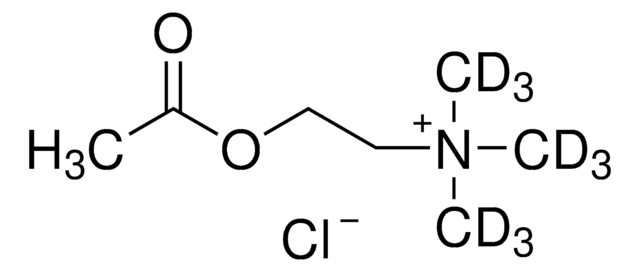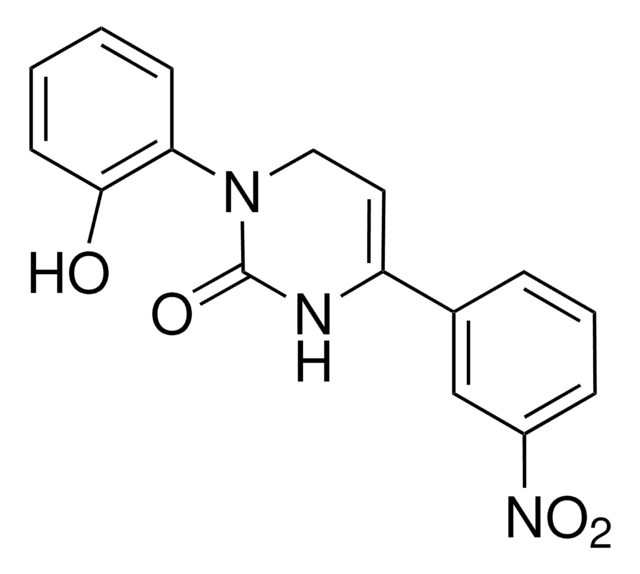A9101
Acetylcholine chloride
≥99% (TLC), powder or crystals
Synonym(s):
ACh
Sign Into View Organizational & Contract Pricing
All Photos(1)
About This Item
Linear Formula:
(CH3)3N+CH2CH2OCOCH3Cl-
CAS Number:
Molecular Weight:
181.66
Beilstein:
3571875
EC Number:
MDL number:
UNSPSC Code:
12352204
PubChem Substance ID:
NACRES:
NA.32
Recommended Products
Product Name
Acetylcholine chloride, pkg of 150 mg (per vial)
Assay
≥99% (TLC)
Quality Level
form
powder or crystals
packaging
pkg of 150 mg (per vial)
mp
146-150 °C (lit.)
solubility
H2O: soluble
storage temp.
room temp
SMILES string
[Cl-].CC(=O)OCC[N+](C)(C)C
InChI
1S/C7H16NO2.ClH/c1-7(9)10-6-5-8(2,3)4;/h5-6H2,1-4H3;1H/q+1;/p-1
InChI key
JUGOREOARAHOCO-UHFFFAOYSA-M
Gene Information
human ... CHRM3(1131)
Looking for similar products? Visit Product Comparison Guide
General description
Acetylcholine is an important neurotransmitter that plays a critical role in multiple neurological systems. Crucial for neurobiology studies, acetylcholine aids researchers in understanding synaptic transmission. In other forms of research, acetylcholine has an effect and influence on tumor neurobiology for cancer R&D, as well as a variety of other cognitive processes.
Application
For use as a substrate to determine acetylcholinesterase activity. Acetylcholine chloride has been used:
- for standard curve preparation in hestrin assay
- in Protein expression, radioactive ligand binding assay and electrophysiological studies of Lymnaea stagnalis acetylcholine binding protein (Ls-AChBPs)
- as a supplement in extracellular solutions for treating the voltage clamped cells in electrophysiology studies
Biochem/physiol Actions
Acetyl choline (ACh) is an essential neurotransmitter in both central and peripheral nervous system. ACh binds to nicotinic acetylcholine receptors (nAChRs) and causes fast excitatory neurotransmission.
Acetylcholine chloride, injected at 20 mg/kg body weight, reduces mortality and plasma proinflammatory cytokines in mice with experimentally-induced sepsis . The cholinergic anti-inflammatory mechanism is probably mediated by interaction of acetylcholine with α7n cholinoreceptor on monocytes, macrophages, and neutrophils, which decreases the levels of proinflammatory cytokines such as TNF-α, IL-1β, and IL-6.
Reconstitution
Reconstituted solution is stable for 2 weeks when stored at 2-8 °C
Storage Class Code
11 - Combustible Solids
WGK
WGK 3
Flash Point(F)
Not applicable
Flash Point(C)
Not applicable
Personal Protective Equipment
dust mask type N95 (US), Eyeshields, Gloves
Choose from one of the most recent versions:
Already Own This Product?
Find documentation for the products that you have recently purchased in the Document Library.
Customers Also Viewed
Evaluation of two WHO First International Standards for Vi polysaccharide from Citrobacter freundii and Salmonella enterica subspecies enterica serovar Typhi.
Gao F, et al.
Biologicals : Journal of the International Association of Biological Standardization (2018)
Molecular recognition of the neurotransmitter acetylcholine by an acetylcholine binding protein reveals determinants of binding to nicotinic acetylcholine receptors.
Olsen JA, et al.
PloS one, 9(3), e91232-e91232 (2014)
Ancestral Reconstruction Approach to Acetylcholine Receptor Structure and Function.
Prinston JE, et al.
Structure, 25(8), 1295-1302 (2017)
Tracey Huynh et al.
Journal of medicinal chemistry, 56(20), 8196-8200 (2013-10-01)
The M4 mAChR is implicated in several CNS disorders and possesses an allosteric binding site for which ligands modulating the affinity and/or efficacy of ACh may be exploited for selective receptor targeting. We report the synthesis of a focused library
Elim Hong et al.
Proceedings of the National Academy of Sciences of the United States of America, 110(52), 21171-21176 (2013-12-12)
The habenulo-interpeduncular pathway, a highly conserved cholinergic system, has emerged as a valuable model to study left-right asymmetry in the brain. In larval zebrafish, the bilaterally paired dorsal habenular nuclei (dHb) exhibit prominent left-right differences in their organization, gene expression
Our team of scientists has experience in all areas of research including Life Science, Material Science, Chemical Synthesis, Chromatography, Analytical and many others.
Contact Technical Service














